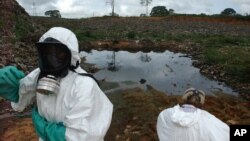Over the next two weeks, 1,500 representatives from 180 countries will seek ways to reduce risks from hazardous chemicals and waste through the sustainable management of these potentially life-threatening substances.
Participants of the conference, which opened Monday in Geneva, also will seek ways to strengthen three international Conventions that together form the basis for addressing these global environmental problems.
The Basel Convention is the most comprehensive international environmental agreement on hazardous and other waste. The Rotterdam Convention deals primarily with the safe international trade of industrial chemicals and pesticides. The Stockholm Convention on Persistent Organic Pollutants is a global treaty to protect human health and the environment from chemicals that remain in the environment for long periods.
Every two years, parties to these Conventions gather to examine new threats and agree on new guidelines and measures for better protecting people from existing and evolving hazardous substances.
One of the big issues confronting this year’s conference is, what the executive director of the United Nations Environment Program, Achim Steiner, calls a tsunami of e-waste unfolding and rolling out over the world. He says electronic waste is now a very significant part of the world’s economic footprint.
He warns that failure to recycle the mountains of electronic waste from cell phones, laptops, microwaves and numerous other products is potentially hazardous to humans and the environment.
“This is under the Basel Convention one of the focal issues of how to deal with electronic waste, which is now a very significant part of our, first of all economic footprint, but more important of our non-recycled waste mountain and because of the content in a great deal of these electronic pieces of equipment, also potentially hazardous to people and the environment,” says Steiner.
In 2001, the Stockholm Convention listed 12 of the most toxic persistent organic pollutants. These so-called Dirty Dozen POPs traveled widely throughout the world and accumulated in the fatty tissue of humans and wildlife, with harmful impacts on human health and the environment.
Since then, 11 more chemicals have been added to the Convention’s list of toxic substances. Participants at the Geneva meeting are expected to list three more highly toxic POPs to the Stockholm Convention.
The World Health Organization reports three million people are poisoned by pesticides every year and that 20,000 of them die, most in developing countries. The Rotterdam Convention has an important role to play in informing people about the dangers of pesticides and how to get rid of those that are obsolete because of the dangers they pose to humans.
The meeting will debate the need to phase out the use of DDT, which continues to be used in many developing countries to control malaria. DDT causes a wide range of serious health problems in humans, including breast and other cancers.
Participants at the meeting are expected to signal to the market that alternatives to DDT and other harmful pesticides are urgently needed.




